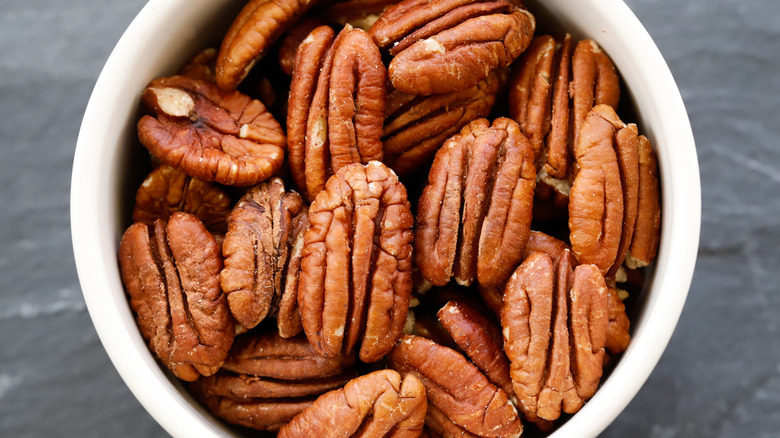
Reaching for a quick snack—such as a handful of nuts—can help curb sudden hunger pangs in a pinch. Brazil nuts, chestnuts, walnuts, and pistachios are a few examples of nuts you should consider eating more often because of their health benefits. A lesser-known (yet equally satisfying) choice is pecans, which are rich in nutrients.
A 2-ounce serving (56.7 grams, or 38 halves) of pecans offers an impressive 23.2 grams of monounsaturated fat (considered heart-healthy by experts), 7.8 grams of carbohydrates, 5.4 grams of dietary fiber, and 5.3 grams of protein, with only 2.2 grams of sugar. Beyond these numbers, research supports the health advantages of snacking on pecans.
In a 2025 study published in The American Journal of Clinical Nutrition, researchers assessed the impact of adding 2 ounces of pecans to an individual’s daily diet. Over 12 weeks, half of the 138 adult participants—all of whom had at least one cardiovascular risk factor (such as high cholesterol, high blood sugar, or hypertension)—were instructed to consume the nutty snack once daily, while the remaining 69 participants maintained their usual diet. The results indicated that those in the pecan-snacking group had a reduced risk of heart disease and a higher-quality diet, along with improved cholesterol levels compared to the other group.
What snacking on pecans can do for your heart health

The 2025 study’s results are consistent with findings from earlier research published in The Journal of Nutrition. Conducted in 2021, the study revealed that individuals who consumed 68 grams (approximately 2.4 ounces) of pecans daily for eight weeks experienced a nearly 5% reduction in total cholesterol levels and up to a 9.5% decrease in LDL (“bad”) cholesterol levels. Lower LDL cholesterol is associated with a reduced risk of stroke and overall improved heart health.
However, snacking on pecans wasn’t entirely without drawbacks. The study authors also aimed to determine if pecan snacking could enhance blood vessel function, but no significant effects were observed in this area. Additionally, participants who snacked on pecans gained an average of 1.5 pounds—though this isn’t entirely unexpected, given that a 2-ounce serving of pecans contains 492 calories. (Fortunately, there are some healthy snacks that can help you lose weight.)
Other health benefits of pecans (and how to incorporate them into your diet)

Ultimately, incorporating pecans into your regular diet can be a good idea, provided you consume them in moderation. Beyond their fiber and protein content, pecans have a low glycemic index, meaning they won’t spike your blood sugar levels. They are also a decent source of omega-3 fatty acids and antioxidants, which can benefit brain health, as well as calcium, magnesium, zinc, and vitamins A and E, all of which support essential bodily functions.
To make snacking on pecans more convenient (and to prevent yourself from reaching for less healthy options like potato chips or crackers), you can prepare serving-sized bags of raw or toasted pecans (for an extra crunch) in advance and carry them with you. Not a fan of snacking? Pecans are versatile: you can add them to oatmeal, salads, breakfast pancakes, or baked recipes, and they also make for a healthy dessert on their own.




